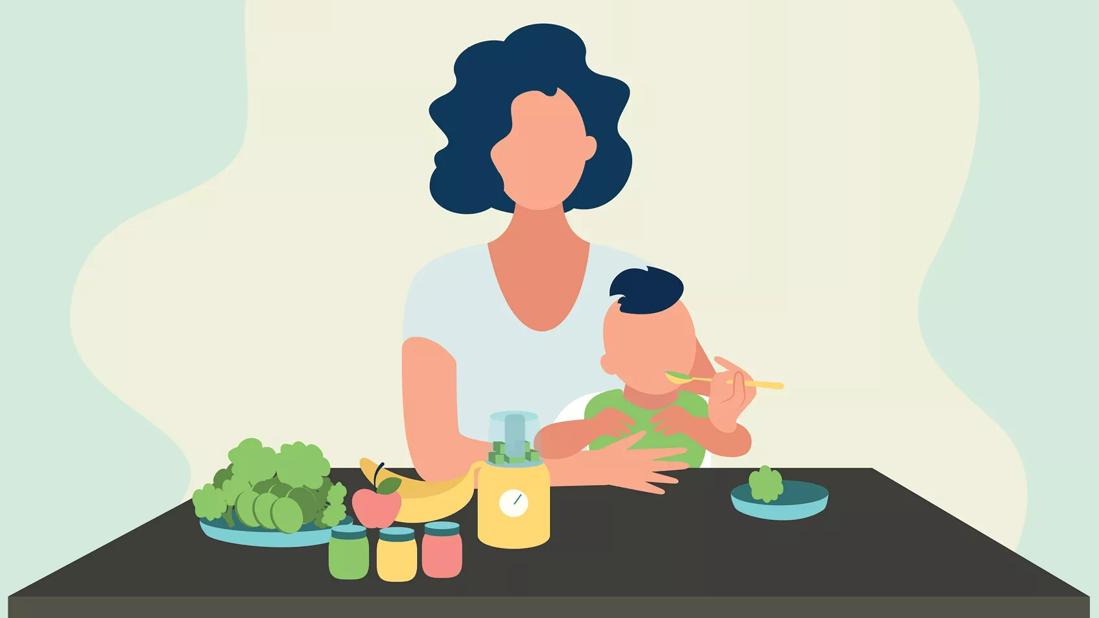And how to wean them off formula when it’s time

Image content: This image is available to view online.
View image online (https://assets.clevelandclinic.org/transform/f287dba7-b796-436d-9511-6d1a4d85a5a6/BabyFoodGettyImages-1297260258_jpg)
A person sits at a table with food and feeds their baby with a spoon
Make the formula. Feed your cutie. Wash, rinse, repeat. For parents of babies who drink formula, you’ve been doing this dance several times a day (and night) for what seems like forever. But could the end finally be in sight? When do babies stop drinking formula?
Advertisement
Cleveland Clinic is a non-profit academic medical center. Advertising on our site helps support our mission. We do not endorse non-Cleveland Clinic products or services. Policy
“A healthy baby should drink breast milk or formula until they are 1 year old. Formulas are fortified with vitamins and iron, which they need,” says pediatrician Radhai Prabhakaran, MD. “Generally, babies should have at least 24 ounces per day between the ages of 9 months to 1 year. But once your baby starts eating a full diet of nutritious solid foods, make the switch to cow’s milk, which offers protein and vitamin D.”
Whether babies are ready to hop aboard the milk express depends on their taste for table food. “Some babies settle into a mostly solid food diet early (between 9 and 12 months) because they like it, and it agrees with them. If they’re eating a nutritionally balanced diet, then it’s OK to wean your baby off formula earlier than 1 year old.”
A healthy solid food diet for a baby should include:
“Gradually reduce the amount of formula they drink as they eat more. Continue to offer it to drink because sometimes babies aren’t full after eating solid foods,” notes Dr. Prabhakaran. “But wait until they are 1 to introduce cow’s milk, even if they wean earlier.”
Your baby should continue with formula if they:
Advertisement
Certain underlying health conditions may affect how long your baby needs to drink formula. Babies may need to stay on formula longer if they have:
“And if your doctor has already told you that your baby might need to go on a special diet, talk to them before weaning your baby off formula,” adds Dr. Prabhakaran. “They can help you put a nutrition plan in place that will make the transition safer.”
Get ready to say goodbye to the bottle. Dr. Prabhakaran says drinking from a bottle is a no-no after age 1. “Bottle feeding can affect teeth growth and cause cavities.”
Instead, transition your little one to a sippy, straw or regular cup at around 9 months of age. “If you’re feeling adventurous, wean them off formula and the bottle at the same time.”
Dr. Prabhakaran notes that most babies this age don’t need to eat when they wake up at night. “Generally, once babies double their birth weight (which happens at around 4 to 6 months) and are regularly eating solids, they don’t need the extra calories and can sleep through the night. So encourage them to keep sleeping.”
Babies at this age also have most of their baby teeth, so drinking milk or formula at night can lead to dental issues. Nighttime feeding can also make them too full to eat what they need during the day.
But as always, there are exceptions. “If your baby’s not gaining weight, your doctor may give you different advice. Breastfed babies may also take a bit longer because breast milk digests faster.”
Dr. Prabhakaran says to take the transition to cow’s milk even slower if babies start drinking milk and experience:
If these symptoms stick around or get worse, talk to your baby’s pediatrician about a potential milk allergy. If needed, your doctor can recommend safe milk alternatives for toddlers.
Advertisement
Signs your baby may not be able to tolerate cow’s milk include:
Experts consider whole cow’s milk the best milk for 1 year olds after they wean off formula. “The general rule is whole milk until they’re 2 years old unless there are specific circumstances,” says Dr. Prabhakaran.
Your doctor may recommend 2% milk instead if your baby:
Unsweetened soy milk tends to be among the best cow’s milk alternatives for toddlers because it has a similar amount of protein. But soy milk is lower in calories — which babies need to thrive — than whole milk. Unsweetened rice milk’s calorie count is a bit higher, but it contains less protein and more added sugar.
The best way to decide, says Dr. Prabhakaran, is to look at your child’s overall diet. “There are so many milk alternatives, and babies’ diets vary so much. It’s impossible to have a blanket rule for what’s OK. Some kids may eat a lot of yogurt and cheese. Some babies are vegan. So talk to your baby’s doctor about the best alternative to help your child with specific deficiencies and their overall nutrition.”
Advertisement

Sign up for our Health Essentials emails for expert guidance on nutrition, fitness, sleep, skin care and more.
Learn more about our editorial process.
Advertisement
When breastfeeding doesn’t go as planned, you may need to supplement with formula or donor breast milk — and that’s OK
Breastfeeding supplements can be a needless expense at best, and risky at worst
Typically, milk comes in a few days after birth and regulates around four weeks after delivery
From the football hold to the cradle hold, consider trying a variety of techniques
Gentle massaging, lying on your side and hand-expressing a little milk can help
Get your milk flowing by getting comfy, releasing stress and focusing on your baby
Popular myth says breastfeeding prevents pregnancy, but that’s not the whole story
With some exceptions, most are OK
Type 2 diabetes isn’t inevitable with these dietary changes
Applying a hot or cold compress can help with pain
Pump up your iron intake with foods like tuna, tofu and turkey